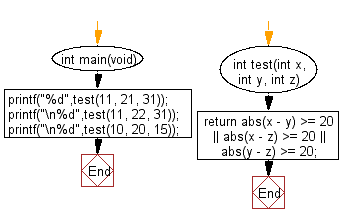C Exercises: Check three given integers and return true if one of them is 20 or more less than one of the others
26. Comparative Check with Threshold 20
Write a C program to check three given integers and return true if one of them is 20 or more and less than one of the others.
C Code:
#include <stdio.h> // Include standard input/output library
#include <stdlib.h> // Include standard library for additional functions
// Function declaration for 'test' with three integer parameters 'x', 'y', and 'z'
int test(int x, int y, int z);
int main(void){
// Print the result of calling 'test' with different integer values and format the output
printf("%d",test(11, 21, 31));
printf("\n%d",test(11, 22, 31));
printf("\n%d",test(10, 20, 15));
}
// Function definition for 'test'
int test(int x, int y, int z)
{
// Check if the absolute difference between 'x' and 'y' is greater than or equal to 20
// or the absolute difference between 'x' and 'z' is greater than or equal to 20
// or the absolute difference between 'y' and 'z' is greater than or equal to 20
if (abs(x - y) >= 20 || abs(x - z) >= 20 || abs(y - z) >= 20) {
return 1; // If any of these conditions is true, return 1
} else {
return 0; // If none of the conditions is true, return 0
}
}
Sample Output:
1 1 0
Explanation:
int test(int x, int y, int z) {
return abs(x - y) >= 20 || abs(x - z) >= 20 || abs(y - z) >= 20;
}
The function ‘test’ takes in three integers x, y, and z. First, the function checks if the absolute difference between x and y is greater than or equal to 20, and if so, returns 1. Then, it checks if the absolute difference between x and z is greater than or equal to 20, and if so, returns 1. Finally, it checks if the absolute difference between y and z is greater than or equal to 20, and if so, returns 1. If none of these conditions are met, it returns 0.
Time complexity and space complexity:
The time complexity of the function is O(1), as it only performs a fixed number of operations, regardless of the input size.
The space complexity of the function is O(1), as it only uses a fixed amount of memory to store the input variables and any local variables.
Pictorial Presentation:
Flowchart:

For more Practice: Solve these Related Problems:
- Write a C program that checks if one of three integers is at least 30 and less than another integer.
- Write a C program to verify if any one of three numbers falls strictly between the other two.
- Write a C program to determine if the smallest of three numbers is at least 15 and less than the largest.
- Write a C program to check if any of three numbers is between 20 and 40, while the others are outside this range.
Go to:
PREV : Same Rightmost Digit in Multiple Integers.
NEXT : Conditional Larger Integer with Remainder Check.
C Programming Code Editor:
What is the difficulty level of this exercise?
Test your Programming skills with w3resource's quiz.
